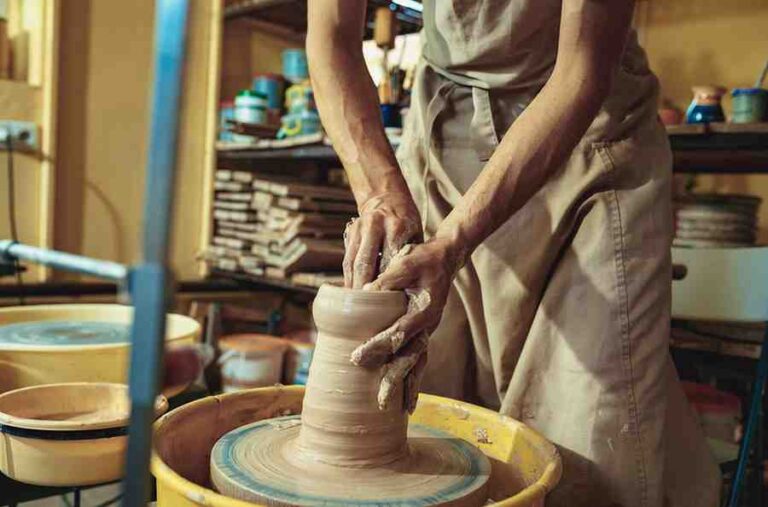Rajasthan, mainly Jodhpur, has developed into a big domestic industry mostly dealing with handicraft and furniture products worth around ₹2000 crores. The handicraft market in Jodhpur is expected to expand into a much larger space, almost doubling its size. Though Jodhpur has already been a hub for the export of handicrafts and furniture, the emerging trend is developing the domestic market as well.
Stories of Local Brand Creators
Gaurav Jain, who has launched his local brand beside his export business, recounts his experiences. “I started my local brand some time ago, and we’ve opened three stores down South, alongside Jodhpur. The response was encouraging, and there are lots of plans for expansion,” he says.
Nirmal Bhandari, with more than 30 years in the handicraft sector, always intended to cover the domestic market. “We’ve opened a store in Jodhpur and now we are taking large orders online from across the country,” This indicates that their shift is toward broadening the market within India.
The ₹2000 Crore Domestic Market
The domestic market for handicrafts and furniture is currently approximately ₹2000 crore, with a potential to double. EPCH organizes two fairs every year in New Delhi and Greater Noida for export purposes. But this year marks the first fair allowed outside of Delhi with the specific purpose of providing an impetus to export and domestic sales.
Export and Expansion
Furniture and handicrafts from Jodhpur have experienced an exceptional rise in export affairs. Here, over 900 people are directly engaged with this industry. However, it is the domestic market now drawing attention. Various young entrepreneurs have begun launching a lot of local brands to bring in business from the new market. The forthcoming Artifact Fair by the Export Promotion Council for Handicrafts (EPCH) is from January 23, which will cater to both export and domestic markets, with invited exhibitors and buyers across India increasing the footfall and visibility of the event.
Expectations from the Artifacts Fair
From January 23 to 26, the EPCH will be holding one of the most prestigious fairs-the Artifact Fair. The fair would be for the export market but will also focus on the domestic one, inviting exhibitors and customers from all over India. This would go a long way in promoting the Jodhpur handicrafts in the country and giving them a much higher degree of visibility and sales.
A Glance at Jodhpur’s Handicraft Industry
- Heritage: This handicraft industry in Jodhpur has been going on for over three decades.
- Entrepreneurship: More than 1,500 persons are into handicraft entrepreneurship/artisanship in Jodhpur.
- Employment: More than 1 lakh people find employment in this industry.
- Export: Exports from Jodhpur are worth approximately ₹5,000 crores every year.
Jodhpur Handicraft Sector: A Closer Look
The craft industry in Jodhpur is not just dominated by great artifacts, but greatly contributes to both the regional and national economies. The central focus was to blend the traditional craftsmanship with contemporary business practices in order to meet international customers while nowadays also concentrating on domestic customers.
Several government initiatives have helped propel the growth trajectory of the sector, combined with the relentless dedication of artisans who have passed on skills through generations. Quality and uniqueness have made Jodhpur a hub for handmade products, from wooden furniture to textiles and decorative objects that are very reflective of the rich cultural heritage of Rajasthan.
Challenges and Opportunities
Even as the industry has to contend with such challenges as competition posed by machine-produced goods and the ongoing necessity for design innovation, there are ample opportunities. In fact, the ever-growing global interest in handmade and unique items fully supports the Jodhpur offerings. Further, the thrust in-demand and adopted sustainability and ethical production habitude opens new segments to consumers, particularly interested ones who are fond of tradition.
Hosting fairs outside Delhi, addressing both export and domestic markets, has been an initiative of EPCH toward capturing additional untapped segments. The way young entrepreneurs-Like Gaurav Jain and mature folks like Nirmal Bhandari have focused attention on local branding shows how bright the future is for handicrafts from Jodhpur. Coupled with projections of a doubling domestic market, it is clear on how growth, employment, and cultural preservation pave the way forward for Jodhpur, keeping its identity as a significant player in the global scene and among the Indian handicraft fraternity.
From an industry that exports, this would lead to a facility that begins valuing and encouraging domestic consumption-and that could really change the economy of Jodhpur; beyond a city of palaces, it would become a world capital for craft and commerce.
Source – Rajasthan Patrika




